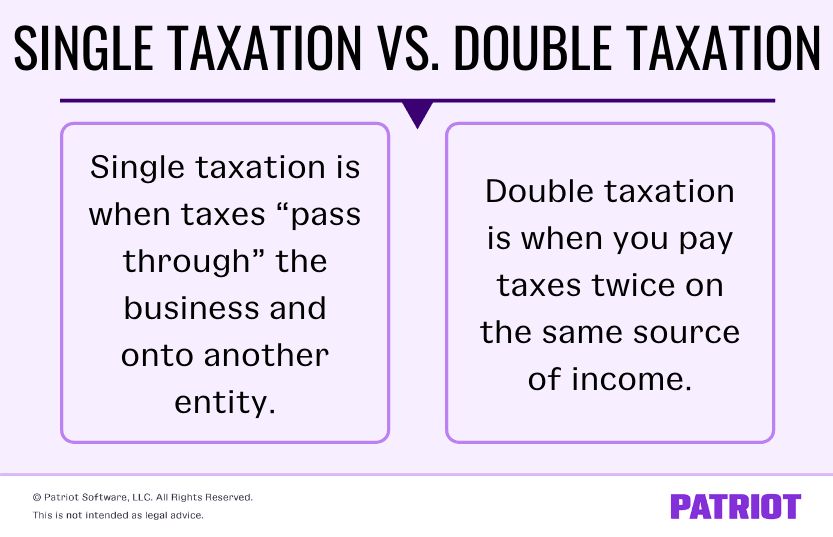Taxes, taxes, taxes. As a business owner or aspiring entrepreneur, you probably dread hearing the word “taxes.” But the truth is, you’re going to hear it a lot when you’re in business. And depending on your type of business structure, you may have single taxation or double taxation.
So … what’s the difference between single taxation vs. double taxation? Read on to find out.
Single taxation vs. double taxation
To get things started, let’s take a look at the key differences between single vs. double taxation.
What is single, or pass-through, taxation?
Single taxation, also known as flow-through or pass-through taxation, is when taxes “pass through” the business and onto another entity, like a business owner. With pass-through taxation, the business avoids having to directly pay the tax. As a result, income is only taxed once.
There are a number of types of pass-through taxes. Pass-through taxes business owners typically deal with include:
- Business income tax: Tax liabilities on business income pass through the company and onto the owner (depending on business structure)
- Sales tax: Tax collected from customers at the point of sale and remitted to state agency
What business entities have single taxation?
There are a few types of business structures that have single taxation on business income tax. They include:
- Sole proprietorships: Owned and operated by one person
- Partnerships: Two or more individuals own and operate together
- S corporations (S Corp): Type of corporation where profits and losses are passed through directly to the owner’s personal income without being subject to corporate tax rates
- Limited liability companies (LLC): Combines aspects of a corporation and partnership
The above structures don’t have to worry about being taxed twice on business income. Owners are only taxed once at the personal level.
What is double taxation?
Double taxation is when you pay taxes twice on the same source of income. When it comes to double taxation on business income taxes, the company is taxed at the personal and business level.
Some business structures are double taxed because they are considered separate legal entities from their shareholders. This provides limited liability to owners (which is something certain structures with pass-through taxation also enjoy).
Certain types of business structures, like S Corps and some LLCs, can avoid double taxation with pass-through taxation.
What business entities have double taxation?
So, which business entities have double taxation? Here are the structures that can’t avoid double taxation:
- Corporations (C Corp)
- LLCs that elect to be treated as corporations
A corporation is separate from its owners. Laws treat corporations as independent legal entities.
Corporations pay taxes on their annual earnings. Corporations don’t pay taxes on business income (retained earnings) until it’s paid out to shareholders as dividends. These dividends also have tax liabilities. So, shareholders who receive dividends must also pay taxes on them.

Pass-through vs. double taxation: Pros and cons
There are upsides and downsides to both pass-through and double taxation. Check out the pros and cons of each below.
Pros of pass-through taxation:
- Income only taxed once
- Business owners can avoid double taxation
- Owners may be able to take advantage of 20% pass-through deduction
Cons of pass-through taxation:
- Owners pay tax on their entire share of income
- More difficult to deduct charitable contributions
- Owners have to pay taxes on their share of retained earnings and fringe benefits
Pros of double taxation:
- Only corporations or LLCs treated as corporations have it
- Business is labeled a separate entity from owners (i.e., limited liability)
- Can be easily avoided (e.g., elect S Corp status with IRS Form 2553)
Cons of double taxation:
- Income is taxed twice
- Shareholders pay taxes a second time on dividends
Single taxation vs. double taxation: Chart
Phew, that was a lot of information to soak in. Luckily, we made this handy chart for you to reference and quickly find must-know information about single vs. double taxation.
| Single / Pass-through Taxation | Double Taxation | |
|---|---|---|
| What is it? | Taxes “pass through” the business and onto the business owner or another individual | Company pays taxes twice on the same source of income (personal and business level) |
| Which business structures have it? | Sole proprietorships, partnerships, LLCS, and S corporations | Corporations and LLCs that elect to be treated as corporations |
No matter if your business has single taxation or double taxation, you need a reliable and affordable way to record your transactions. With Patriot’s online accounting software, you can easily track income and expenses and get back to business. Try it for free today!
This is not intended as legal advice; for more information, please click here.



